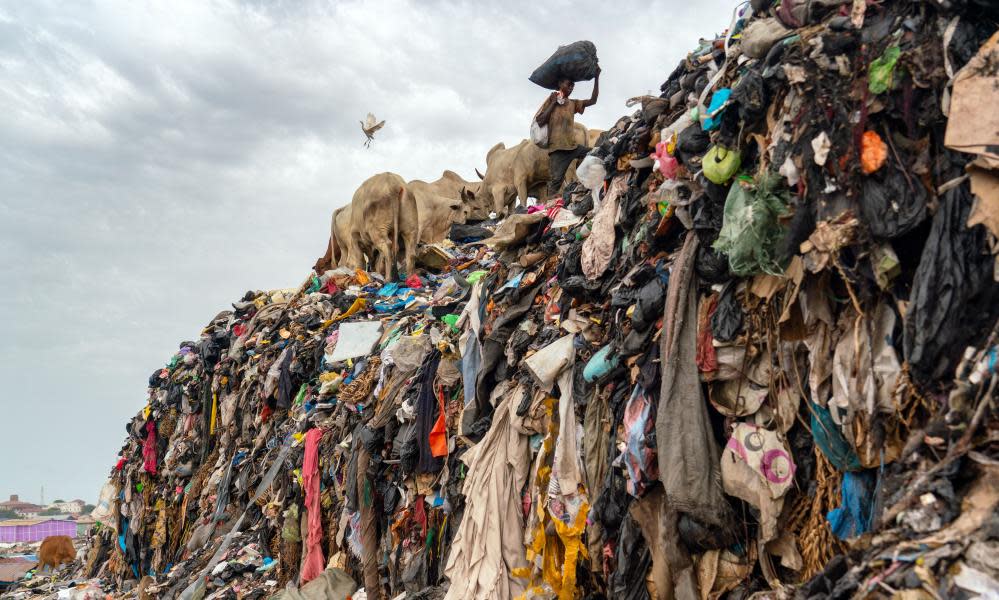Stop dumping your cast-offs on us, Ghanaian clothes traders tell EU

A group of secondhand clothes dealers from Ghana have visited Brussels to lobby for Europe-wide legislation to compel the fashion industry to help address the “environmental catastrophe” of dumping vast amounts of textiles in the west African country.
The traders from Kantamanto in Accra, one of the world’s largest secondhand clothing markets, met Alice Bah Kuhnke, an MEP with Sweden’s Green party, environmental organisations and representatives from the European Commission and the European Environment Bureau to argue that proposed extended producer responsibility (EPR) regulation should ensure Ghana receives funds towards managing the 100 tonnes of clothing discarded at the market every day.
Producers are obliged by EPR policies to contribute to the disposal of waste generated by their products. France is currently the only country in Europe with an EPR that covers the textile industry.
Related: Fast-fashion giant Shein pledges $15m for textile waste workers in Ghana
Critics say the policy does little for “end-of-line” countries such as Ghana – because the fee paid by clothing producers is low at just €0.06 (5p) for each item, and the funds raised do not “follow exports” to countries such as Ghana, which are suffering the consequences of over-production and consumption in wealthy countries.
The Kantamanto traders want the draft EPR policy – due to be submitted in June – to increase the fee to a minimum of €0.50 cents for each item, and to guarantee a fair portion of the money goes to the countries where the secondhand clothes end up, including at least 10% towards an environmental fund to clean up previous damage.
Kantamanto, which emerged in the 1960s out of a colonial-era mindset that pushed Ghanaians to adopt western clothing, now covers about 7 hectares (18 acres) of land, handling about 15m garments a week and providing work for about 30,000 people.
Retailers buy and sort through 55kg (121lb) bales of clothing – most of it is either “deadstock” (clothes kept in warehouses and storerooms for years but never worn) or items donated to charities or left in recycling bins. About 6m of the better-quality items are sold or upcycled in the market every week.
But about 40% of the textiles that arrive in Kantamanto are discarded as waste. The growth in “fast fashion” is pushing that figure up, and bringing a higher volume of lower-quality secondhand clothes. The drop in quality leads to more waste and erodes the traders’ earnings, sending many into debt.
“Kantamanto makes visible the problem that exists in Europe,” said Samuel Oteng, a designer and community engagement manager with the Or Foundation, a US environmental organisation based in Accra that works with Kantamanto and funded the delegation’s visit to Europe.
“But Kantamanto also has the solutions,” he said. “I’ve seen the resilience of Kantamanto, but the support and recognition is not there.”
The traders want new legislation to acknowledge the role of Kantamanto’s workers in recycling the global north’s cast-offs.
“By nearly any other measure, recirculating 6m items of clothing weekly is an astonishing feat. What leaves Kantamanto Market as waste does so largely because there is simply too much clothing, not because people are not working hard to manage it,” according to the Waste Landscape report, published by the Or Foundation in 2022.

Solomon Noi, part of the delegation and director of waste management for Accra metropolitan assembly, said it was impossible for the city to cope with the volume of market waste. Between 2010 and 2020, 10 legal rubbish dumps in the city were closed after reaching capacity.
Today authorities transport waste from the market to Adepa dump, 30 miles (50km) north of Kantamanto, but they can only handle about 30% of the total clothing waste and the remaining 70% ends up in ditches and drains, leaching dyes into the sea and rivers, and covering beaches with vast tangles of clothing.
“It is growing in the sea – turtles cannot come to the beach, the coral is dying, the fishers can’t fish. It’s an environmental catastrophe,” said Noi, speaking at the ChangeNOW conference in Paris, which the delegation visited after lobbying in Brussels.
He said the global north had a responsibility to help with waste management infrastructure and logistics.
Related: Fast fashion speeding toward environmental disaster, report warns
“We rely on our taxes [to raise money] to manage the waste, but taxes go to education, health,” Noi said. “Little is left to manage textile waste. And why should I work hard to get my taxes to get rid of your [the global north’s] waste? We have had enough.”
The Or Foundation is also calling on clothing companies to disclose the volume of garments they produce each year and to commit to reducing that by 40%.
“None of this matters if we don’t slow down production,” said Liz Ricketts, a co-founder of the organisation. “The issue isn’t organic versus non-organic; there is simply too much clothing.”

 Yahoo News
Yahoo News 
